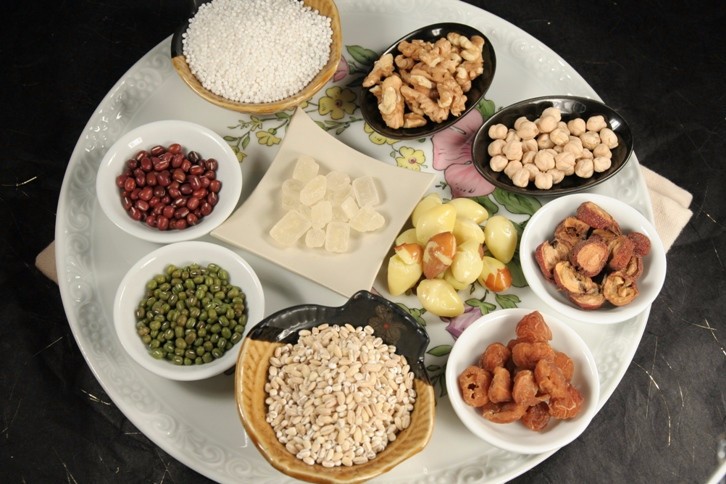Chinese Laba Festival (Rice Porridge Festival)
Introduction

Origins
2. They other said it was related with Sakyamuni, the founder of Buddhism. Legend said that it was on the 8th day of the 12th lunar month that Sakyamuni attained enlightenment and became a Buddha. To commemorate this, on that day people eat porridge to make offerings to the Buddha every year, and the porridge was called 'Laba porridge'.
Fast Facts about Laba Festival
| Chinese Name: | 腊八节 Làbā Jié |
|---|---|
| Alternative Names: | Rice Porridge Festival, the Day of Enlightenment |
| Date: | Dec.8th (Chinese Lunar Calendar) |
| Festival Type: | Traditional Chinese Festival |
| Traditions and Customs: | Eating Laba rice porridge, Making ‘Laba garlic’ (Garlic pickled in vinegar) |
| Festival Food: | Laba porridge |
Date of Laba Festival
| Year | Date of Laba Festival |
|---|---|
| 2024 | January 7th, 2025 |
| 2025 | January 26th, 2026 |
| 2026 | January 15th, 2027 |
Traditions and Customs

Main traditions for Laba Festival are eating Laba porridge and making Laba garlic.
Laba Rice Porridge:
Mainly popular in Northeast China, Northwest China and Jiangnan (lands immediately to the south of the lower reaches of the Yangtze River), Laba porridge is the essential food for the festival. Since the Song Dynasty (960 - 1279 AD), it has had the custom of eating Laba porridge on the Laba Festival. During the Qing Dynasty (1644 - 1911 AD), emperors usually offered Laba porridges to their officials and the common people made it for sacrificing to their ancestors. Buddhist temples offered Laba rice porridges to the poor to show their faith to the Buddha. It was also used to present relatives and friends.

Laba porridge usually contains glutinous rice, wheat, corn, dried dates, lotus seeds, peanuts, loongan meat, red beans, peas, millet, raisins and some other ingredients. It was mostly made with eight ingredients and boiled as the way to boil the common porridge. By adding some sugar or salt, it will be tastier. As the beans is hard to boil, it's better to soak them for hours before boiling. After the porridge is done, it is customarily offered to the gods and ancestors as the sacrifice first. Next can be send to relatives and friends. But it should be sent before noon. Finally, family enjoys it together. To left some porridge is good, as it means there will be leftovers each year.
Making Laba garlic on the Laba Festival is a custom in northern China. It is very easy to make. The ingredients are garlic and vinegar. After peeling the garlic and putting it in a jar and filling it with vinegar (sugar can also be added), the rest time is to wait. Almost twenty days later, the garlic will become green. People usually eat it together with the dumplings on the Spring Festival Eve.

Legends
More Traditional Chinese Festivals:
Chinese Spring Festival Lantern Festival Dragon Heads-raising Day Qingming Festival Ghost Festival Double Seventh Festival Dragon Boat Festival Mid-Autumn Festival The Double Ninth Festival Winter Solstice
Chinese Calendar
| Su | Mo | Tu | We | Th | Fr | Sa |
|---|---|---|---|---|---|---|
| 29初五/5 | 30初六/6 | 1初七/7 | 2初八/8 | 3初九/9 | 4初十/10 | 5十壹/11 |
| 6十二/12 | 7十三/13 | 8十四/14 | 9十五/15 | 10十六/16 | 11十七/17 | 12十八/18 |
| 13十九/19 | 14二十/20 | 15廿壹/21 | 16廿二/22 | 17廿三/23 | 18廿四/24 | 19廿五/25 |
| 20廿六/26 | 21廿七/27 | 22廿八/28 | 23廿九/29 | 24三十/30 | 六月 (Jun) 25初壹/1 | 26初二/2 |
| 27初三/3 | 28初四/4 | 29初五/5 | 30初六/6 | 31初七/7 | 1初八/8 | 2初九/9 |
{{week}}. {{month}} {{day}}, {{year}}
Lunar Date
{{lmonth}} {{lday}}, {{syear}} ({{zodiac}}) Year ({{lyear}}){{sday}} Day, {{smonth}} Month
Auspicious
-
{{#luckly}}
- {{.}} {{/luckly}}
Inauspicious
-
{{#unluckly}}
- {{.}} {{/unluckly}}
Auspicious Times
-
{{#luckyTime}}
- {{.}} {{/luckyTime}}
